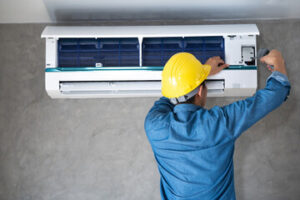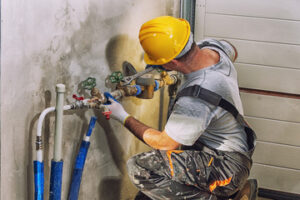Air conditioning units are the superheroes of our homes on hot summer days, but even superheroes need a little maintenance. Learn about AC Repair North Hollywood so you can understand the process better and feel confident calling in the professionals.

A clogged or frozen evaporator coil can prevent your AC from cooling your home properly. A professional can use a vacuum or hose to clear the clog and defrost the coil.
The blower motor in your HVAC system moves air through the ducts and into the cabin, which is how your AC circulates cold or hot air. Like other mechanical and electrical parts, the blower motor can be prone to problems that need professional repairs. A few common problems include poor airflow, an inoperable blower motor, a dirty fan or a faulty capacitor.
Poor airflow is typically a sign that the blower motor needs to be replaced. However, it can also be a sign of a larger problem that needs to be addressed in the system. A lack of airflow can be caused by dust and debris accumulation, a defective motor resistor module or connections, a broken fan or a bad relay. If you can’t find a clear cause of the problem, it’s best to contact a professional air conditioning service.
A squealing noise from the blower motor is another common sign that it’s time for a replacement. This noise may occur every time the blower runs or it may happen intermittently. The sound could indicate that the motor is reaching the end of its life or it may need to be replaced because the bearings are worn out.
An inoperable blower motor is one of the most serious symptoms that your air conditioning system is experiencing. It’s usually easy to identify a problem with the blower motor, but it’s important that you contact an expert to help diagnose the issue and repair it.
A reliable HVAC company will inspect the blower motor before submitting a quote for repair or replacement. This allows them to find the right replacement motor for your system and ensures that it will work properly with the other components in the unit. The right replacement motor will ensure that your system will continue to function well for years to come. A good HVAC company will provide a high-quality replacement and offer a warranty on the new blower motor. They will also ensure that the correct size replacement is used so that your HVAC system continues to operate at peak efficiency.
Thermostat
Your thermostat is your direct line of communication with the HVAC system. It sends signals to the system to turn on and off, and to change the temperature as needed. Thermostats can often get clogged with dust and other debris. This can cause problems with the internal triggers. A faulty thermostat can also result in inaccurate temperature readings. This can lead to energy waste and higher utility bills over time.
A few easy fixes for a malfunctioning thermostat can help you save money and avoid costly AC repair. First, make sure your unit is properly installed. The thermostat should be located in a central area of the home, about five feet off the ground and away from any heat sources such as sunlight, other appliances, heater vents or windows. The thermostat should also be clear of any blockades such as furniture or drapes, which may prevent airflow through the return and supply vents.
Another quick fix is to replace the batteries. Most units have standard AA or R6 batteries that can be changed in minutes, and the process is relatively simple. Lastly, dust the thermostat with a soft brush to remove any build-up. This can be especially important if the unit is old and hasn’t been cleaned in a while.
Thermostats that aren’t responsive to changes in the environment can be frustrating on hot or cold days. A professional technician can diagnose the problem and determine whether it requires a new thermostat, a new blower or another more complex AC repair.
Depending on the severity of the issue, the technician will recommend a course of action that fits your needs and budget. A minor AC repair or replacement can help you extend the life of your unit, while a more complicated problem may push you toward a complete system overhaul. The expert technicians at Gee! Heating & Air can provide you with a thorough inspection and assessment of your cooling system. Contact us today to schedule an appointment! We serve homes and businesses in the greater Detroit, Michigan, area. We offer 24-hour emergency AC repair services, and our technicians are licensed and insured.
Contactor
In addition to capacitors, another common AC component prone to wear and tear is the contactor. This is a type of switch that’s responsible for turning your system’s components on and off. If it fails, your system won’t start or run. The contacts in the contactor snap together through magnetic action each time the system starts up, drawing high peak currents that eventually burn them up. This is caused by a combination of excessive inrush currents, unstable control voltages, and too low transition times between the high peak currents. It can also be exacerbated by dirt, dust or moisture ingress into the air gap around the electromagnetic coil.
The good news is that the contactor and start/run capacitor are relatively inexpensive parts, making them a safe bet to replace when they fail. In fact, your AC technician will likely do this during a routine maintenance appointment — provided that they aren’t dealing with a more serious problem like a refrigerant leak.
Besides replacing the parts that are damaged, your AC technician will also recharge your system. Recharging involves adding more refrigerant to your system, which allows it to cool and dehumidify your home as it should. The process is done by hand, and it requires a special gauge that can measure the exact amount of refrigerant needed to fill your unit.
If your AC repair includes addressing a refrigerant leak, the service technician will have to drain your unit’s lines and drip pan before recharging it. They may also have to repair any faulty connections and seals. If your AC repairs involve a refrigerant leak, it’s important to have a qualified specialist do the job to avoid contamination. They’ll also be able to determine whether your system is in need of a complete replacement or a simple repair. With this information, you’ll be able to make the best decision for your home and budget.
Refrigerant
Many homeowners are unsure what role refrigerant plays in their air conditioner’s operation. It is a chemical compound that can transition from liquid to gas and back again. Its ability to absorb and transfer heat has made it the essential ingredient in cooling, refrigeration, and heat pump systems for decades. While the term “refrigerant” is often associated with a specific brand, such as Freon, the generic name for any type of refrigerant will suffice.
During normal operation, refrigerant travels between two sets of coils in your system: an indoor and outdoor coil. The refrigerant absorbs heat and humidity from the indoor air, which is cooled by the blower fan and then sent outside. This process repeats until the desired indoor temperature is reached. A leak in the system, however, will allow refrigerant to escape.
A professional technician can find the source of a leak and repair it. He will also locate and correct any major underlying issues that may be causing refrigerant loss. When refrigerant is lost, the AC’s output shifts from cool air to room temperature. This can lead to serious safety problems if it is allowed to continue for too long, such as skin or eye irritation and dizziness.
In some cases, your technician might recommend adding more refrigerant to your system to compensate for a leak or other issues. Be wary of any technician who says your refrigerant needs to be topped off, as this could mean they are either trying to scam you or don’t know what they are doing.
Your air conditioning contractor will likely replace your old refrigerant with a new, safe and environmentally friendly option. There are several different types of refrigerants available, including R-22, HCFC-22, and Norflurane. The R-22 refrigerant is being phased out because it contains chlorine, which has been shown to damage the ozone layer. The HCFC-22 and Norflurane refrigerants contain no ozone-depleting chemicals and are safer for the environment.

